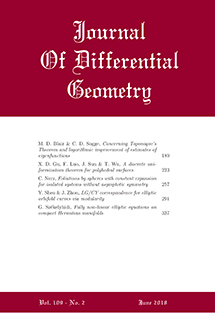Abstract
We consider minimal surfaces $M$ which are complete, embedded, and have finite total curvature in $\mathbb{R}^3$, and bounded, entire solutions with finite Morse index of the Allen-Cahn equation $\Delta u+ f(u) = 0$ in $\mathbb{R}^3$. Here $f = −W'$ with $W$ bi-stable and balanced, for instance $W(u) = \frac{1}{4} (1 − u^2)^2$. We assume that $M$ has $m \ge 2$ ends, and additionally that $M$ is non-degenerate, in the sense that its bounded Jacobi fields are all originated from rigid motions (this is known for instance for a Catenoid and for the Costa-Hoffman-Meeks surface of any genus). We prove that for any small $\alpha \gt 0$, the Allen-Cahn equation has a family of bounded solutions depending on $m − 1$ parameters distinct from rigid motions, whose level sets are embedded surfaces lying close to the blown-up surface $M_\alpha := \alpha^{−1}M$, with ends possibly diverging logarithmically from $M_\alpha$. We prove that these solutions are $L^\infty$-non-degenerate up to rigid motions, and find that their Morse index coincides with the index of the minimal surface. Our construction suggests parallels of De Giorgi conjecture for general bounded solutions of finite Morse index.
Citation
Manuel del Pino. Michal Kowalczyk. Juncheng Wei. "Entire solutions of the Allen-Cahn equation and complete embedded minimal surfaces of finite total curvature in $\mathbb{R}^3$." J. Differential Geom. 93 (1) 67 - 131, January 2013. https://doi.org/10.4310/jdg/1357141507
Information





